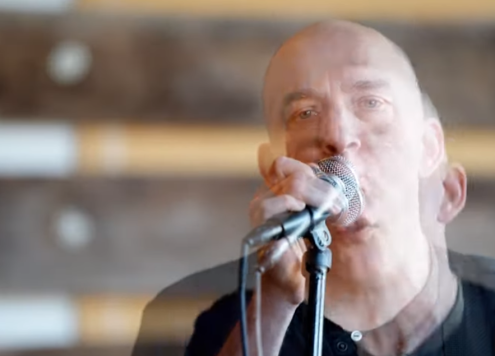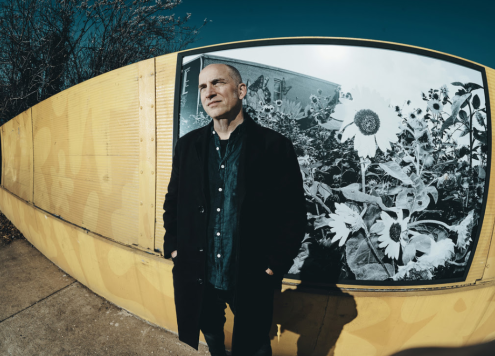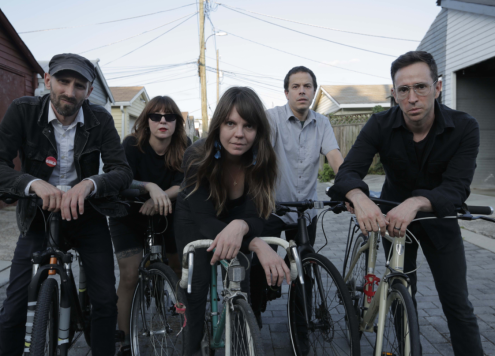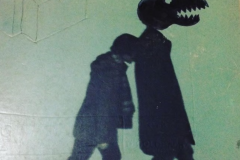Ha, I had to laugh at this one because I’ve said it before and I’ll say it again, this label is on some next-level shit. Chicago’s Culture Power 45 just released Lost Cargo 7, its compilation series featuring local artists. This time around the label features Davis Jackson’s “Disappear,” ML7102 WITH “Hidden Substance,” 9th Scientist’s “Arcana Illative,” and untitled blank with “N1.” Here’s the thing though, this is a cassette-only release but to top it off, it’s limited to 10 copies. Get it if you can!

J. ROBBINS – BASILISK
The year has barely begun, and we’ve all been inundated with changes, literally rewritten history, death & disease, government lies, and many fighting for their own identities, which all lead to an abundance of challenges. This is why we should look in other directions for solutions and always avoid those who tell us, “Don’t look up!” For many, we can find inspiration in dealing with this reality through art, especially music.
It doesn’t seem like it was very long ago when J. Robbins released his debut solo album Un-Becoming, a blistering look into societal woes and what it has become, through anthemic chord progressions with unwavering punk enthusiasm. But that was 5 years ago. Again, it doesn’t seem that long ago. Today sees the release of Robbins’ sophomore release, Basilisk (Dischord) and while there may have been a lengthy gap between releasing the material, the new album was recorded back in 2021. If anyone was wondering though, Robbins isn’t short of providing creative bombasts here from one track to another. While most musicians find themselves settling into acoustic versions of their former selves – that’s not to say he hasn’t dabbled within – Robbins continues to fan the flames. Joining him is drummer/percussionist Darren Zentek (Kerosene 454, Channels) and once again on bass, Brooks Harlan (War On Women).
While Robbins has become a well-sought-after producer, it takes nothing away from his skill as a songwriter/musician. He places wide-eyed lyricism over clever musical backdrops that never mask the subject matter. Robbins’ delivery is clear and while it may seem indirect, it never deviates. One thing that’s different about Basilisk is Robbins’ feats at even challenging himself, broadening his range since his last release. What the hell am I referring to? Well, if you listen to the opening “Automaticity,” he plays with keyboard notes to form the melody of the song but that doesn’t mean guitars are eschewed here, as tempos change and dynamics charge through with hooks that shiver and explode with refined command. It’s the strengthened “Last War” though where Robbins and his band lead a powerful charge with an unrelenting rhythm as he reflects on a historical past as we fail to learn from it with “What’s the past for/if it stares you in the eyes/but the lessons pass you by.” Of course, he makes all the sense in the world finishing his thought with “When your task force fails the crash course/you can tell yourself you tried/but I wanna do better than survive.” The music matches the passion of his words.
Robbins switches things up with the melancholic “Not The End” as the tempo moves a bit more slowly while contemplating the future and knowing all too well that this isn’t the end. The track is again led by keyboard notes & chords as guitars play 2nd chair. At just under the two-minute mark, it’s emotional and foreboding. One thing about Basilisk is its propensity to thrive in areas where sounds are massive, bordering on anthemic. Robbins’ songs just seem to flow that way and there’s nothing wrong with that. It works in everyone’s favor. Glimpses are found in “Old Souls” while they flagrantly mark territories in “A Ray Of Sunlight.” Hell yes it is! But through his own confession, listening to shoegaze, he again shifts parameters on “Sonder,” a liberating atmospheric track embellished with guitar feedback, echoing voices in the distance and an array of effects. This could have been a path solely traveled and while he may play within other subgenres, it’s still noticeably J. Robbins. Even with “Open Mind, washes of guitar allow Robbins to play in different spaces, with laidback rhythms allowing the song to take on a life all its own.
To say that hardcore Jawbox fans have been waiting patiently for new material from Robbins is probably an understatement. But with Basilisk, Robbins sidesteps any notion of a sophomore slump with an album that’s nothing less than astounding. Here we have an album that cements his legacy as a solo artist.
J. MASCIS – WHAT DO WE DO NOW
Is there an end in sight? Better yet, should there be a stopping point for an artist who has had decades of writing, recording, and performing? Within Hip-Hop, those young kids think “old heads” should retire from music altogether but fortunately, they don’t listen. Instead, we have revitalized artists like Nas putting youthful rappers to shame. But I digress. It’s never applied to rock artists, that is of course an artist has pigeonholed itself into a singular genre (hair metal, boy band, etc.)
With Dinosaur Jr.’s J Mascis that’s never seemed to be the case. For those that don’t remember or don’t know, back in 1993, a Spin magazine cover even exclaimed “J Mascis Is God.” The recognizable guitarist sat in a multicolored chair, draped in a velvet dinner jacket. But again, I digress. Throughout his career both solo and within bands, Mascis has performed on over 25 full-length releases (aforementioned Dino Jr., Sweet Apple, Witch, etc.) and now releases the new What Do We Do Now (Sub Pop). What we get on his 5th solo long-player is different.
For the most part, What Do We Do Now is a lowkey affair as we find Mascis knack for churning out melodies wrapped around his signature vocal delivery alive and well. With the opening “Can’t Believe We’re Here” he plays a majority of the time through clean guitars accented by the piano work of Ken Mauri of the B-52s. The two ride the melody for all its worth as Mascis’ laconic voice drifts across it. His rhythm is steady, and of course it is! The multi-instrumentalist dons many hats again here knowing what and how he wants things done here. He allows his electric guitar to hiss, even if it is briefly, reverting back to how the song originated. Ok, the musical overlord has spoken! Songs are fitted with distorted guitar solos but they’re scattered throughout but they’re not the focal point. What songs may lack in overdrive they make up in sweet & subtle addictive melodies. “What Do We Do Now” lacks nothing with a simple chorus and melody that’s inviting…but wait! Ah, Mascis does toy with our emotions, fitting in a quick solo a few times here but it’s his voice that keeps hitting on the chorus.
It’s not as if Mascis has never played with this formula before but here it seems a bit different, possibly because we’ve become accustomed to his flagrant guitar screams. I’m not knocking any of it because it’s what I’m always coming to hear. As he explores the subtleties within “Right Behind You,” the notes on the rhythm guitar he’s playing stand out which is intriguing. One might think there’s no room for the wail of his electric guitar, but he finds room for it halfway through the track. The structure here is meticulously constructed but when that guitar howls, it’s magnificent. Mauri plays a larger role on the album than I thought he did. It’s understated in “You Don’t Understand Me” but obviously there. As is that guitar, a bit limited but still noticeable enough to make its presence known. I’ve been leaning more into “Old Friends,” because it hits more like a Dino track but unmistakably J Mascis. The two will forever be intertwined but it’s the rhythm and territorial markings that shake and stir the senses. And then there’s “Set Me Down,” which takes a bit of a different route, moving slower but with a changing rhythm that allows it to stand apart from the rest. Halfway through the atmosphere changes and the electric juices of guitars are squeezed out briefly but still inventive.
J Mascis has always been a favorite of many music listeners and musicians alike, including myself. Throughout What Do We Do Now there isn’t a feeling of urgency or need to force songs to more in a general direction, everything seems to flow naturally. This is probably what we all should expect from him at this point, allowing the music to take on a life all its own through those wicked guitar solos over the acoustic feel of the music. Thank you and yes please, I’d like more. Mascis must continue playing and recording forever.












Social Media